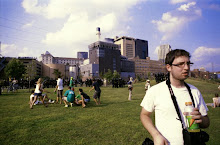In response to "Teaching Photography: Notes Assembled"
Is there a place for zoom lenses in photography, or are they a crutch?
I have a bias against zoom lenses, so it shouldn't come as any surprise that I believe prime lenses are more than adequate in any shooting situation. Zoom lenses are clunky, not particularly sharp, and they're slow. Slow, not only in terms of their maximum aperture, but also in the way that it takes longer for a person to frame up a shot. I have two perfectly functioning legs, which offer adequate zooming functions. As a result of only owning prime lenses, I have been able to act more instinctively with my cameras, which has allowed me to focus on other aspects photograph. Will prime lenses make you an award-winning photographer? No, not by a long shot. It will, however, give you one less thing to worry about. Simplicity is bliss, buy prime lenses.
In response to an interview of Stephen Shore by Tim Davis
Has the rise of print-on-demand services like Blurb diminished the value of the photo book?
Not long ago, it became very cheap to record a broadcast quality album within your own home. This allowed bands that were truly talented to produce and sell their own music. This has led to a very healthy underground music scene throughout the country and has given way to independent labels such as No Idea!, Plan-It-X, Afternoon Records, etc. Unfortunately, it also made it possible for talentless musicians to produce and sell a lot of bad music. The rise of print-on-demand services presents the same problems for photographers. On one hand, it allows talented photographers to make books without having to appeal to publishers like Aperture or Phaidon, which offers photographers a way to spread their creative seed across the land. On the other, it poisons the well with a lot of lackluster art. Which is more important?
Do you agree that photography is a problem-solving device?
We humans are skeptical of just about anything we can't see. Photography has, in many ways, made it possible to create a fairly undeniable way of recording visual information. Of course, we trust that everything depicted in the photographed is as it was when it was recorded and not altered in any way. As a result, anything we see in Time magazine, we interpret as truth, because we trust the photography, but more than that, the integrity of the magazine. So when we see photographs of atrocities thousands of miles away from us plastered across the front page, we have a hard time denying the existence of such things. Photographs also add a level of realism that words cannot properly convey. In this way, photographs are also more efficient. We can learn more in a second of staring at photograph than we can reading the whole article accompanying it. A single photograph can put people in a frenzy and before you know it, people are demanding something (the something is generally not specified or well thought out) be done. In a roundabout way, I do believe that photographs can be problem-solving devices as long as you have somebody competent at the helm.
Join Us This Summer
13 years ago




No comments:
Post a Comment